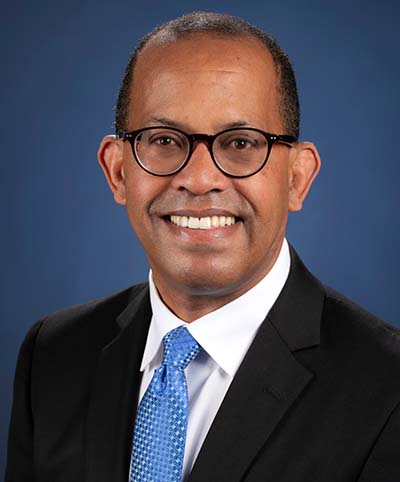Five Ways to Counter Implicit Bias
 Sky Zheng, Ph.D., CEO, Interactive Pro
Sky Zheng, Ph.D., CEO, Interactive Pro Oliver Beach, General Manager, Jolt UK
Oliver Beach, General Manager, Jolt UK Gabriela Burian, Global Director for Sustainable Food Systems, Bayer Crop Science
Gabriela Burian, Global Director for Sustainable Food Systems, Bayer Crop Science Douglas Haynes, Ph.D., Vice Chancellor for Equity, Diversity and Inclusion, UCI
Douglas Haynes, Ph.D., Vice Chancellor for Equity, Diversity and Inclusion, UCITechnology has brought our world together in dramatic fashion, joining a rich variety of cultures and customs into one vibrant global community. The benefits are significant: Businesses can work with employees and clients across multiple continents, and students anywhere in the world can take classes at UCI or any school offering online instruction.
Gaining exposure to a wider range of cultures, races and gender identities can be hugely rewarding personally and professionally, expanding awareness as well as opening new markets. But there are potential pitfalls when it comes to unconscious bias — social stereotypes that lurk below the level of awareness.
Unconscious or implicit bias is far more common than conscious, explicit bias. Recognizing these blind spots can be challenging, even for outwardly enlightened individuals, as we all learn to live and work together. That’s why it’s imperative for organizations to educate and promote cultures of diversity, equity and inclusion that benefit everyone.
“We are all living in this interconnected global village with a common stake,” said Sky Zheng, CEO of Interactive Pro, an international online education facilitator. “All countries are closely connected and share in a common future. Leaders who have a global mindset enable companies to open up to more global opportunities while recognizing the challenges in different countries and cultures, presenting and finding solutions.”
Zheng was part of a panel of experts that addressed the following strategies for confronting blind spots and raising awareness in the moderated UCI webinar Leadership Strategies: Minimizing Unconscious Bias.
1. Cultivate self-awareness
Becoming more self-aware is a powerful way to recognize and reign in negative unconscious tendencies — and it’s essential for leaders in building organizations where people feel valued and excited to work, said Oliver Beach, general manager of Jolt, a leading innovator in online education.
“First of all, unconscious bias is a lack of self-awareness,” Beach said. “We show our bias when we’re unaware of ourselves and the people around us, and it manifests itself in so many different scenarios including job interviews, the people you bring into an organization, how meetings are set up, how you give a voice to other people in your team.”
A lack of self-awareness precludes sensitivity to other people’s realities, and it prevents leaders from changing their behavior or even recognizing unconscious bias when it happens.
2. Promote global awareness
For global corporations, educating leadership and employees on the cultures and customs in the countries where they operate is key to countering unconscious bias. And at companies like Bayer Crop Science, it’s an important part of doing business.
“When we’re in North America, Latin America, Europe and Asia, we recognize that each one is a different situation,” said Gabriela Burian, global director for sustainable food systems at Bayer, which spans six continents and over 100,000 employees. “What we’ve been doing is mapping out each country, highlighting where our company is. It’s one of the tools that we use to help adapt our employees to the local reality.”
It’s especially important to foster multicultural awareness at a university like UCI which has tens of thousands of international students and employees, said Douglas Haynes, Vice Chancellor for Equity, Diversity, and Inclusion at UCI.
“It’s important to celebrate cultural diversity by learning more about the very diverse communities that represent us as faculty, staff and students, but also the surrounding community,” he said. “We can’t assume that everyone knows what implicit bias is.”
“Becoming more self-aware is… essential for leaders in building organizations where people feel valued and excited to work.”
Oliver Beach, General Manager, Jolt
3. Teach diversity, equity and inclusion
Each person has a different life journey that helps inform their worldview. Someone who has lived among diverse populations or traveled widely, for example, can have greater awareness of potential bias than those who haven’t had that advantage. But education can help broaden perspectives and make up for lack of real-world experience.
Haynes points to his own journey growing up in culturally diverse San Francisco and moving outside of his comfort zone by traveling. “I think it’s so important to see diversity, equity and inclusion as a process of personal growth, because otherwise it’s easy to sort of get grounded in one place, and that’s where you start having blind spots,” he said.
“My role is about personal growth and career advancement, and one of the key things is equipping people with diversity, equity and inclusion as a competency. That’s something that is really a learning process where people enter at different stages and can continually grow.”
4. Listen and learn
Bringing to light hidden bias isn’t solely a top-down endeavor, but rather involves a loop of sorts in order to adapt and learn about other cultures, Burian said. She calls it reverse mentorship — having leadership listen to feedback from the people the company serves and does business with. “If we can meet and talk with leaders then we have reverse mentorship, where we can provide feedback to leaders and vice versa. Leaders can hear from the communities.”
Simply put, constructive feedback is essential for recognizing and minimizing unconscious bias fostered by an unfamiliar culture or identity. “This is when we need to hear other voices,” Burian added.
5. Support inclusive organizations
Choose to support and work at organizations that reflect the right values — and speak up if you feel they fail to live up to their initial promise. That’s the path Oliver Beach took before he joined Jolt. At the time, he was raising capital from investors and made it clear he only wanted to work with people who share and respect his values.
“I only want to work with investors who care about diversity, inclusion and equity, because those are areas which are really important to me and the communities I work with” he said. “They’re really important in the work that I do with Out in Tech, this incredible global LGBT+ tech nonprofit which I brought over to the U.K. from the U.S.”
This is not just words. Beach has actively refused and walked away from investment when capital was coming at a cost. “I’m not willing to compromise on integrity for equity,” he said.
View recorded webinar: Leadership Strategies: Fostering Culture Through Inclusion and Innovation
Learn more about Corporate Education and Global Partnerships.
